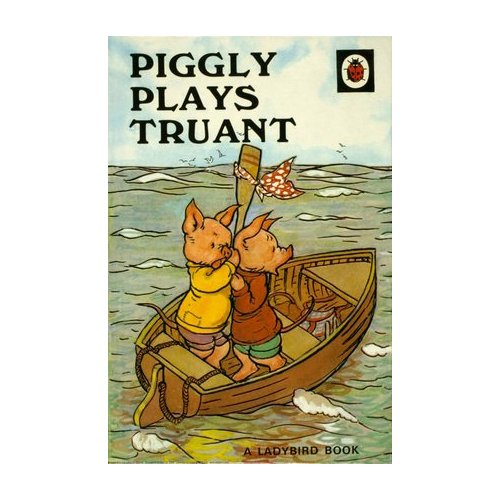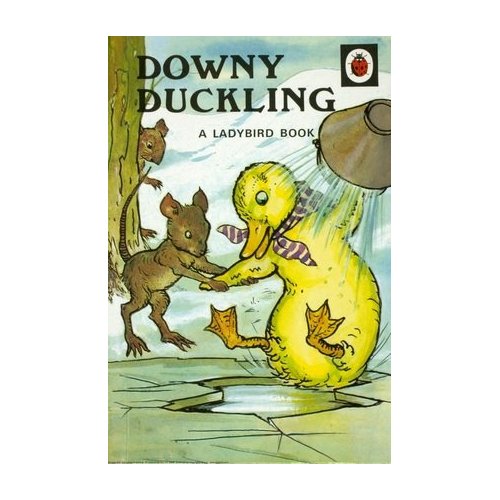Ladybird Books play an integral part in the prehistory of CT (and, as my daughter points out, in the upbringing of her monstrous brother).[1] Above are the covers of the two that my father recited over and over again to me as a kid (and that we recite to the little horror in turn). Very different; whereas Piggly is a ne’er do well, Downy is punished for good deeds (but — spoiler alert — is rescued at the last minute). Almost unknown in the US (though, in one of the odder moments in my marriage, I was being entertained by my wife’s former boyfriend’s parents when I happened upon Piggly on one of the bookshelves where they were keeping books in preparation for the hoped-for grandchildren). Anyway, in addition to the addictive Boys and Girls: A Ladybird Book of Childhood (UK
), we now have beautiful prints of the above to adorn the little horror’s room, courtesy of this amazing service. For Piggly, only the cover is available; but every single page of Downy is available. Quite who wants to adorn their house with prints of every single page of Peter and Jane I’m not sure; but I can quite see it with this one (my favourite below the fold).

And here’s the link to Valerie Singleton self-parodying brilliantly.
[1] CB’s initial post is once more lost to posterity.


{ 13 comments }
Henry 07.22.09 at 8:59 pm
Ah, but thanks to the wonders of archive.org, “The Internets Never Forgets”:http://web.archive.org/web/20060328174440/http://junius.blogspot.com/2003_01_05_junius_archive.html (or, at least, it remembers more than you might think at first). The relevant post is halfway down the page.
John Quiggin 07.22.09 at 9:26 pm
And the Internets links to itself. The scourge of linkrot has been cured!
Tim Wilkinson 07.22.09 at 9:48 pm
It forgets what it is told to forget.
Chris Williams 07.22.09 at 9:49 pm
This thread would not be complete without a link to the ‘policeman’ parody:
http://www.stuff.co.nz/dominion-post/news/1250054/The-Policeman-ladybird-book
James Davies 07.22.09 at 11:42 pm
Wow, talk about a trip down memory lane. I was born in 1975, and my grandfather from Wales used to send these Ladybird books to us in the United States. I fondly remember the Magic Porridge Pot (we didn’t have porridge in the States; we had oatmeal), Five Little Kittens, and my favorite, Smoke and Fluff. I can still recite sections from that book. If my mom fell asleep while reading it to us, or said a word wrong, she’d get a elbow jab in the ribs. “You’re not doing it right mommmm!”
=]
John 07.23.09 at 7:22 am
That’s New Road, the county cricket ground of Worcester. It really does look like that, when it’s not under 6 feet of water.
belle le triste 07.23.09 at 8:05 am
downy duckling is terrifying — on the face of it it’s a domestic accident rather than punishment (he’s fetching water from the frozen river) and he’s rescued, yes — but he and has family will have to face the collective trauma of processing how incredibly quickly and casually his mum gave up on the situation: “i lost my son! oh, well, back to the ironing”)
harry b 07.23.09 at 3:49 pm
That’s right about downy duckling, and it is only the rather sinister looking mouse that notices downy’s potential for survival, and saves the day. I remember finding the mouses (sorry, mice) creepy, and one of my kids did too, but my perceptive son likes them.
Alan Peakall 07.23.09 at 5:08 pm
I fondly recall the introductory physics quartet: “Levers, Pulleys and Engines” on mechanics, “Air, Wind and Flight” on fluid dynamics, “Magnets, Bulbs and Batteries” on elctro-magnetism and “Light, Mirrors and Lenses” on optics.
tom s. 07.23.09 at 5:18 pm
Following Alan Peakall, it’s the non-fiction Ladybird books that I remember. The historical figures series counts for the bulk of the history I carry around with me. I dread to think what prejudices I absorbed by rereading Oliver Cromwell over and over – I’m sure there was no mention of the unfortunate episode with the Irish.
Alison P 07.23.09 at 8:16 pm
I’ve just spent half the day browsing that site. ‘What to look for in Spring’ – beautiful pictures. Tootles the Taxi. Our Land in the Making. Puppies and Kittens. ‘All, all are gone, the old familiar faces’.
Chris Bertram 07.26.09 at 10:24 am
Not lost to posterity, as I have the archive on my hard drive:
Post #1
I was looking on my shelves the other day at a set of children’s book, bought when I was six or seven years old. They were published by Ladybird and deal with a range of issues, including English history. The history books have titles like William the Conqueror, Alfred the Great, The Story of Charles II and so on. In each book, the final two pages are given over to a succinct summary of the significance for subsequent history and politics of the figure in question. These articulate a world-view which wouldn’t be found in any history-book today. Indeed, in retrospect, the remarks are often hilarious. (Despite that, I remember these books from my childhood with affection: they gave me both a sense of the narrative sweep of history and an enduring interest in the subject.)
Two particularly noteworthy conclusions are those from William the Conqueror and Alfred the Great. Here’s how William the Conqueror ends:
bq. William the Conqueror, now called William I, was the first real King of all England.
bq. By means of the Domesday Book he knew exactly where everyone lived, and how much property they owned. This meant that for the first time in the history of England, it was possible to ensure that all the people paid their correct taxes to the King.
bq. And by means of the castles which were built all over the country by his Norman knights, William was able to keep the King’s peace.
bq. All this took a long time to do, but it meant in the end that after more than six hundred years of fear and uncertainty, the people of England were once more able to live their lives and work at their trades in safety.
This last page is illustrated by a picture of a blacksmith shoeing a horse watched by two children, one of whom holds the horse’s reigns while the other is carrying a basket overflowing with apples.
The conclusion to Alfred the Great is even more Podsnapperish:
bq. To-day, wherever you live in England, in town or country, you are in one of the shires into which Alfred divided his kingdom.
bq. It was not easy for Alfred to do this in the days when there were no proper maps of the country, and no means of marking them. So Alfred had to send men in all directions marking rivers, streams, hills and roads as the boundaries of counties and parishes.
bq. That is why, to-day, these boundaries so often run along the banks of rivers; they have not changed since King Alfred’s men passed that way, driving in posts to mark the divisions.
bq. These were a few of the changes which the wise King Alfred achieved for England, and it is because of this that he is known in history as Alfred the Great.
bq. But there is one other thing, perhaps the greatest of all, and the one which is the most important to every one of us to-day.
bq. English law and English justice are known and respected throughout the world, for in this country of ours it is almost impossible for an innocent man to be sent to prison. This we own, in the first place, to King Alfred.
bq. So England became a free country and we should always remember that it might have been very much less free if Alfred the Great had not lived and ruled, a thousand years ago.
Those county boundaries might not have shifted in the thousand years up to the publication of that Ladybird book (c. 1963), but they have been moved, adjusted and tampered with quite a few times since. And of course even a children’s book would not now declare, after the Guildford Four and the Birmingham Six (together with many less famous cases) that “in this country of ours it is almost impossible for an innocent man to be sent to prison”.
Chris Bertram 07.26.09 at 10:26 am
Oh, and there was a post #2, but it only links back to Kieran.
Comments on this entry are closed.